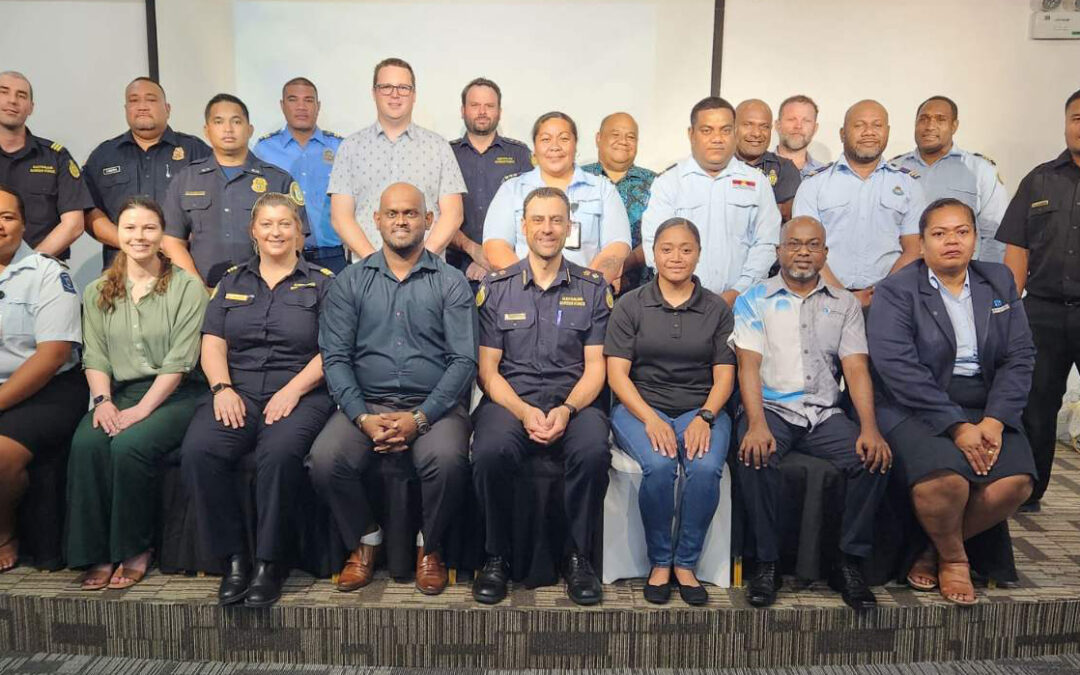Nadi, Fiji – November 26, 2024–Customs officers from across Oceania met in Nadi last week for an intensive training program to tackle the growing problem of drug smuggling in the region.
The Oceania Customs Organisation (OCO), in partnership with the Australian Border Force (ABF), held a five-day course focusing on small craft monitoring, a key tactic in disrupting the flow of illicit drugs.
“Drug traffickers increasingly view our Blue Pacific as a transit point for their poison,” said Acting Head of Secretariat for OCO, Mr Raginald Khan.
“Each vessel carrying illicit substances that we intercept represents lives saved and communities protected. The OCO Pacific Small Craft Application (OPSCA) has become our frontline defense in this ongoing battle.”
The training specifically for regional coordinators of OPSCA comes at a critical time when Pacific countries are witnessing increasing attempts to use their waters as transit routes and destination locations for illicit drugs such as methamphetamine, cocaine, and cannabis. These drugs, often transported via small craft, pose a significant threat to Pacific communities and their way of life.
Launched in 2018, OPSCA enables customs administrations to share information amongst partner nations to help combat drug trafficking. The application provides customs officers with real-time monitoring capabilities of small craft movements, helping intercept vessels potentially involved in trafficking illicit drug and other transnational crimes.
ABF Superintendent Uriah Turner emphasised the importance of regional collaboration: “We are committed to working with our Pacific partners. The high drug prices in Australia, New Zealand, and the Pacific make us an attractive target for organised crime. Information and intelligence sharing through programs like this are vital. We work in a complex operating environment, and it is critical that we collaborate to share information and intelligence to address this ongoing threat. These training programs through the OPSCA provide us with the perfect platform to do this.”
The training covered key areas such as maritime intelligence, risk management, counter-smuggling techniques, vessel monitoring, and regional cooperation. Participants from various Pacific customs agencies gained expertise in detecting sophisticated smuggling operations.
“This OPSCA forum provides a valuable opportunity to strengthen regional networks and enhance coordination. It also helps us develop a risk management framework to facilitate legitimate travel while maintaining border security,” said Mr. Adrian Reynolds, Principal Officer, Border Control, Vanuatu Customs and Inland Revenue.
Mr. Stuart Kingmele, Team Leader of Investigations, Anti-Smuggling and Maritime Support of Solomon Islands Customs also commented on the training: “OPSCA has unified the recording of small craft movement within the region, making monitoring and profiling simpler and more effective.”
The training included practical scenarios based on recent drug seizures in Pacific waters, ensuring officers are prepared for real-world challenges.
“The threat of transnational drug trafficking cannot be understated,” said Mr Khan. “By bolstering our regional coordination and intelligence sharing through OPSCA, we are building a stronger defense against those who seek to exploit our waters.”
Notes to Editors:
- OPSCA has contributed to several significant drug seizures since its introduction in 2018
- The Pacific region has seen an increase in attempted drug trafficking via maritime routes
- The Regional Coordinator Forum comprises specially trained Customs Officers managing OPSCA at the national level
About the Oceania Customs Organisation
The Oceania Customs Organisation (OCO) is an intergovernmental organization that represents the interests of Customs administrations in the Pacific region. OCO’s mission is to promote regional cooperation and capacity building in Customs matters.
84 Harris Road, Private Mail Bag, Suva, Fiji | Tel: (679) 3313110 Fax: (679) 3313126 | info@ocosec.org www.ocosec.org
